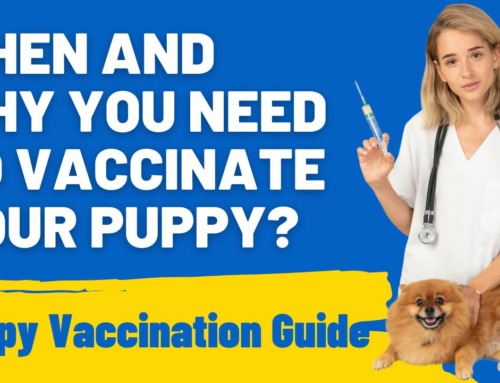Ensuring your puppy’s health and well-being is a crucial responsibility for any pet parent.
A healthy puppy is a happy puppy, and your commitment to their well-being lays the foundation for a long, joyful life together.
From nutrition and exercise to mental stimulation and regular vet check-ups, our guide covers all you need to know.
We understand that your puppy is not just a pet but a beloved family member, and taking care of your puppy’s health and well-being is as rewarding as it is important.
So, let’s dive into these vital tips to ensure your puppy grows up healthy, happy, and strong.
Why is Your Puppy’s Health and Well-being So Important?
The health and well-being of your puppy are not just important; they are fundamental to their overall quality of life. As a puppy grows, their early experiences and care set the stage for their physical and emotional development.
A healthy puppy is more than just free from illness; it’s about a holistic approach to their growth, encompassing physical fitness, mental stimulation, and emotional nurturing.
Firstly, taking care of your puppy’s physical health through proper nutrition, regular exercise, and routine veterinary care helps prevent numerous health issues.
It ensures they grow up strong and resilient. A well-nourished and active puppy is less likely to develop issues like obesity, heart disease, and joint problems, which can impact their life span and quality of life.
Mental and emotional well-being is equally crucial.
Puppies thrive on interaction, play, and learning. Providing mental stimulation through training, playtime, and socialization builds their confidence and aids in behavioral development.
A well-socialized puppy is more adaptable, less prone to anxiety, and better equipped to handle stress.
Moreover, focusing on your puppy’s health and well-being creates a deep bond between you and your furry companion.
It fosters a relationship built on trust, understanding, and affection. This bond is not only gratifying but also enhances the effectiveness of training and companionship.
What Are the Basics of Puppy Health?

Understanding the basics of your puppy’s health and well-being is a pivotal step in ensuring they grow into a happy, healthy adult dog. From nutrition to routine care, these fundamentals are the pillars of a thriving life.
Optimal Nutrition
The foundation of good health starts with proper nutrition. Puppies require a diet specifically formulated for their growth and development needs.
High-quality puppy food should be rich in proteins, healthy fats, vitamins, and minerals to support their rapid growth.
It’s essential to adhere to a feeding schedule and maintain appropriate portion sizes to prevent obesity.
Exercise and Physical Activity
Physical activity is crucial for puppies. Regular exercise aids in maintaining a healthy weight, developing strong muscles and bones, and supporting cardiovascular health. It also plays a significant role in behavioral development.
Activities like walking, playing fetch, or agility training are not only physically stimulating but also mentally engaging for your puppy.
Vaccinations and Preventive Healthcare
Vaccinations are vital to protect against common diseases such as parvovirus, distemper, and rabies.
Regular veterinary check-ups are crucial for monitoring your puppy’s health and catching potential issues early.
Preventive measures also include treatments for fleas, ticks, and heartworms, which are essential for your puppy’s long-term health.
Dental Health
Dental care is an often-overlooked aspect of a puppy’s health. Regular dental check-ups, brushing, and specific dental treats can prevent gum disease and tooth decay.
Good dental hygiene contributes to overall health and prevents future complications.
Mental and Emotional Health
A puppy’s mental and emotional well-being is just as important as physical health.
Mental stimulation through training, socialization, and play helps prevent behavioral issues and supports cognitive development.
Positive interactions and bonding activities foster a sense of security and well-being.
Routine Veterinary Care
Regular vet visits are crucial for maintaining your puppy’s health.
These visits allow for health monitoring, vaccinations, and addressing any concerns you may have. They are key to preventive care and early detection of health issues.
How Often Should You Visit the Vet?

Regular veterinary visits for puppies are a cornerstone of maintaining your puppy’s health and well-being. For puppies, the frequency of these visits is higher than for adult dogs.
Initially, puppies need to see the vet every 3-4 weeks until they are about 16 weeks old. These visits are crucial for completing their vaccination series and monitoring their development.
Once your puppy reaches six months, the vet visits may become less frequent, typically transitioning to annual check-ups unless there are health concerns.
Remember, these regular visits are not just for vaccinations but also for comprehensive health checks, addressing any concerns, and getting professional advice on nutrition, behavior, and overall care.
What Should You Know About Puppy Nutrition?
Navigating the world of puppy nutrition is vital to ensure your puppy’s health and well-being. Puppies have unique dietary needs that are different from adult dogs.
They require more protein, fat, and certain vitamins and minerals to support their rapid growth and development.
The Right Balance
A balanced diet for a puppy includes high-quality protein sources for muscle growth, fats for energy, and carbohydrates for sustained energy and healthy digestion.
It’s also essential to include a proper balance of calcium and phosphorus to support bone health.
Portion Control and Feeding Frequency
Puppies grow rapidly, and their diet needs to fuel this growth. However, it’s crucial to avoid overfeeding, which can lead to obesity.
Typically, puppies should be fed three to four times a day. As they grow, you can gradually reduce feeding to twice daily.
Special Dietary Considerations
Each breed and individual puppy may have specific dietary needs. Larger breeds, for instance, may require special diets to prevent growth-related issues.
Always consider your puppy’s specific needs, which can be determined in consultation with your vet.
The Transition to Adult Food
As your puppy grows, you’ll need to transition them to adult dog food. This transition should be gradual, usually starting when they reach about 80% of their expected adult size.
Understanding and meeting your puppy’s nutritional needs is a key aspect of their overall health and development.
Proper nutrition sets the stage for a lifetime of health and happiness, ensuring your puppy grows up to be a strong, healthy adult dog.
What Are the Best Foods for a Puppy?
Choosing the right food is critical for your puppy’s health and well-being. The best foods for puppies are those that provide a balanced diet tailored to their developmental needs. These foods support their rapid growth, bone development, and overall health.
- High-Quality Protein Sources: Puppies need more protein than adult dogs. Look for foods that list real meat, like chicken, lamb, or fish, as the first ingredient. These proteins are essential for muscle development and overall growth.
- Healthy Fats: Fats are crucial for energy and the development of the brain and nervous system. Sources like fish oil are excellent for providing omega-3 fatty acids, beneficial for coat and skin health.
- Carbohydrates and Fiber: Carbohydrates provide energy, while fiber supports digestive health. Whole grains, sweet potatoes, and peas are good sources of these nutrients.
- Vitamins and Minerals: A good puppy food will include essential vitamins and minerals like calcium and phosphorus for bone growth and development.
- Avoid Fillers and Additives: Avoid foods with excessive fillers, additives, or by-products. These can be hard on your puppy’s digestive system and offer little nutritional value.
Remember, while dry kibble is a popular choice, some puppies may do better with wet food, especially if they are picky eaters or have dental issues.
Consulting with your veterinarian can help you choose the best food for your puppy’s specific needs.
Best Foods for Puppy Growth and Development
| Food Type | Benefits | Recommended For |
| Real Meat | Muscle growth, overall health | All puppies |
| Fish Oil | Brain development, coat health | Puppies with dry skin/coat |
| Whole Grains | Energy, digestive health | Active puppies |
| Sweet Potatoes | Fiber, vitamins | Puppies needing digestive support |
| Calcium & Phosphorus | Bone development | Large breed puppies |
| Eggs | High-quality protein, vitamins | Puppies for extra protein boost |
| Fresh Vegetables | Natural vitamins, minerals | All puppies for balanced diet |
| Yogurt (Plain) | Probiotics, calcium | Puppies needing digestive aid |
How Can You Create a Healthy Environment for Your Puppy?
Creating a healthy environment for your puppy is vital for their development and well-being. This involves ensuring your home is a safe, nurturing space.
Start by making sure your living area is free from hazards such as loose wires, toxic plants, and small objects that could be swallowed. Maintain cleanliness to prevent the spread of germs. Provide a comfortable resting area with appropriate bedding.
Consistent routines for feeding, playtime, and rest are crucial. Regular interaction and positive reinforcement contribute to a supportive atmosphere, promoting both physical and mental health.
Remember, a healthy environment is about safety, comfort, and a regular schedule that meets your puppy’s needs.
Why is Exercise Vital for Your Puppy’s Well-being?
Exercise plays a crucial role in your puppy’s health and well-being. It’s not just about keeping them physically fit; it’s about their overall development.
Regular exercise helps in building strong muscles and bones, ensuring proper growth. It also significantly impacts their mental health, reducing anxiety and behavioral issues like excessive barking or chewing.
Engaging in physical activities helps expend their abundant energy and keeps them stimulated.
Moreover, exercise is key for socialization, allowing puppies to interact with different environments, people, and other dogs.
What Are Some Safe and Fun Exercise Ideas for Puppies?
- Short walks in the park
- Fetch games
- Tug of war with a soft toy
- Puppy playdates
- HoundGames’ Puppy Play Mat
- Agility training for beginners
- Gentle swimming sessions
- Hide and seek games
- Obstacle courses tailored for puppies
- Interactive toys like puzzle feeders
- Controlled free play in a secured yard
- Exploratory hikes on safe, puppy-friendly trails
What Role Does Grooming Play in Your Puppy’s Health?
Grooming is more than just keeping your puppy looking good; it’s an essential part of their health and well-being.
Regular grooming keeps your puppy clean, helps you spot any skin issues or parasites early, and contributes to their overall comfort.
It also provides an opportunity for bonding and getting your puppy used to being handled, which is beneficial for vet visits.
Essential grooming tasks for dogs include:
- Brushing fur
- Bathing
- Nail trimming
- Ear cleaning
- Teeth brushing
- Paw care, including checking and cleaning between the pads
- Regularly checking for fleas and ticks
How Can You Monitor and Support Your Puppy’s Healthy Growth?
Monitoring and supporting your puppy’s growth is key to ensuring they develop healthily. Regular weigh-ins help track physical development, ensuring they are growing at an appropriate rate.
Observing their behavior and energy levels offers insights into their overall health. Feeding them a balanced diet formulated for puppies supports proper growth.
Regular veterinary check-ups are essential for monitoring growth and addressing any concerns.
Additionally, engaging in appropriate exercise supports physical development while avoiding overexertion.
Being attentive to your puppy’s development helps you make necessary adjustments to their care routine, ensuring they grow into a healthy adult dog.
Essential Puppy Care Checklist
| Care Aspect | Details | Check |
| Nutrition | Balanced diet suitable for puppies; regular feeding schedule | |
| Exercise | Daily physical activity appropriate for their age and breed | |
| Veterinary Care | Regular check-ups, vaccinations, and preventive treatments | |
| Grooming | Regular brushing, bathing, nail trimming, ear and teeth cleaning, paw care | |
| Training | Basic obedience training, socialization, housebreaking | |
| Mental Stimulation | Interactive play, puzzle toys, new experiences | |
| Rest | A comfortable sleeping area, quiet time for relaxation | |
| Safety | Puppy-proofing the home, safe play area | |
| Love and Affection | Regular bonding time, positive reinforcement |
What Are the Common Health Challenges for Puppies?
Puppies, as they grow and develop, can encounter a range of health challenges. Awareness of these issues is crucial for proactive care and ensuring your puppy’s well-being.
Parasitic infections, such as worms, are common in puppies and can impact their overall health if not treated. Vaccinations are crucial to protect against diseases like parvovirus, distemper, and rabies.
Puppies are also prone to digestive issues, which could be due to dietary changes or sensitivities. Skin conditions, such as allergies and mites, can cause discomfort and require attention.
Other challenges include hip dysplasia in larger breeds, which can affect joint health, and congenital diseases that may not be immediately apparent.
Additionally, teething can be painful and lead to chewing behaviors.
Other Common Health Challenges include:
- Kennel Cough
- Urinary Tract Infections
- Flea Infestation
- Ear Infections
- Eye Problems (like conjunctivitis)
- Bone and Joint Issues
Conclusion
Embarking on the journey of puppy parenthood is an enriching experience that involves a proactive approach to your puppy’s health and well-being.
Regular vet check-ups, a balanced diet, and a nurturing environment contribute significantly to their development. The key is continuous learning and adapting to your puppy’s changing needs.
By providing your puppy with the care and love they need, you set the stage for a lifetime of happiness and companionship.
Remember, each challenge is an opportunity to strengthen the bond you share with your furry friend.




